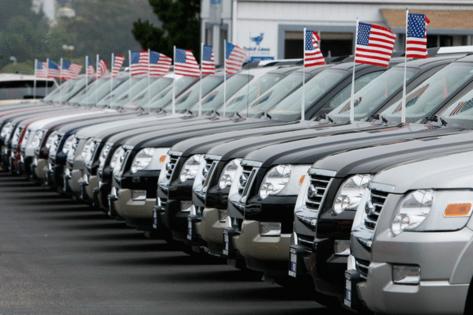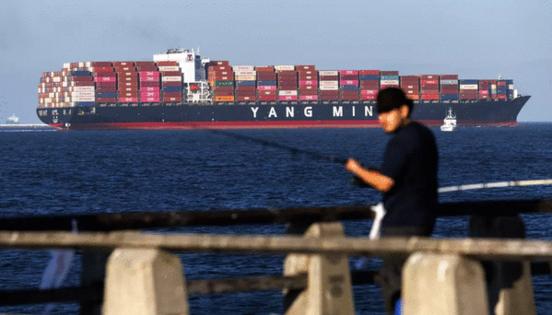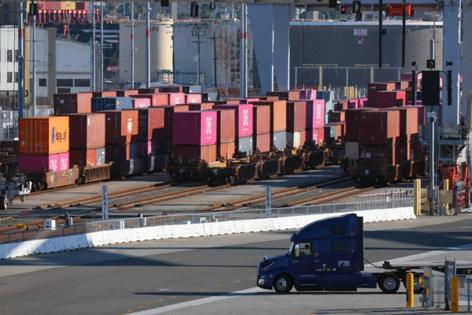Trump's proposed tariffs could bring higher prices for groceries, cars and clothing
Published in Political News
Steep price hikes could be on the way if President-elect Donald Trump follows through on his pledge to impose sweeping new tariffs on imports from Mexico, Canada and China.
Trump threatened to implement the tariffs on the country’s top three trading partners on his first day back in office, including a 10% tariff on products coming from China. In a pair of posts on Truth Social on Monday, he explained the decision as a way to crack down on illegal immigration and drugs.
“On January 20th, as one of my many first Executive Orders, I will sign all necessary documents to charge Mexico and Canada a 25% Tariff on ALL products coming into the United States,” he said. “It is time for them to pay a very big price!”
But it’s ultimately consumers who could end up absorbing the brunt of those costs. When tariffs are levied against foreign imports, American companies have to pay taxes to the U.S. government on their purchases from other countries; the companies often pass on those extra costs to their customers.
California’s economy could be especially hard hit because of its heavy reliance on trade with China and Mexico.
“This is a bully effort to put everybody on notice,” said economist Chris Thornberg, founding partner of Beacon Economics in Los Angeles. “One of the reasons he uses tariffs is because it’s one of the few places that he actually has some leverage.”
Although Thornberg noted that it’s still a “giant remains-to-be seen” whether and how Trump’s proposed tariffs are implemented, consumer goods across the board could be dramatically affected by the changes.
Here are a few top categories:
Cars and car parts
Mexico was the United States’ top goods trading partner last year, surpassing China.
The country is a major manufacturer of passenger vehicles, light vehicles, trucks, auto parts, supplies and electric-vehicle technologies. Eighty-eight percent of vehicles produced in Mexico are exported, with 76% headed for the U.S., according to the International Trade Administration.
Automakers with manufacturing operations in Mexico include General Motors, Ford, Tesla, Audi, BMW, Honda, Kia, Mercedes Benz, Nissan, Toyota and Volkswagen. GM shares fell 9% and shares of Ford declined 2.6% on Tuesday.
Even before Trump’s latest round of tariff threats, auto-related companies shared how they planned to respond if new duties were levied.
“If we get tariffs, we will pass those tariff costs back to the consumer,” Phil Daniele, chief executive of AutoZone, said in the company’s most recent earnings call. “We’ll generally raise prices ahead of … what the tariffs will be.”
Toys
Last year, China accounted for 77% of toy imports, about 25 times greater than the total value of toy imports from Mexico, the next largest foreign source of supply, according to the National Retail Federation. U.S. producers, meanwhile, account for less than 1% of the toy market.
Earlier this month, the federation released a study that looked at how the tariffs that Trump proposed during his campaign for a second term could play out for consumers.
It found that the proposed tariffs — a universal 10% to 20% tariff on imports from all foreign countries and an additional 60% to 100% tariff on imports specifically from China — would apply to a wide range of toys imported into the U.S., including dolls, games and tricycles.
“Our analysis found that toy prices would face one of the highest increases,” the study concluded. “Prices of toys would increase by 36% to 56%.”
Apparel
The National Retail Federation study also analyzed more than 500 items of clothing including tops, bottoms, underwear, swimwear and socks, and found that prices “would rise significantly” — as much as 20.6%.
That would force consumers to pare spending on apparel. The higher prices and loss of spending power would hit low-income families especially hard, the group said, because low-income households spend three times as much of their after-tax income on apparel compared with high-income households.
“U.S. apparel manufacturers would benefit from the tariffs, but at a high cost to families,” the study said. “Even after accounting for domestic manufacturing gains and new tariff revenue, the result is a net $16 billion to $18 billion loss for the U.S. economy, with the burden carried by U.S. consumers.”
Produce
With Americans already wary of high grocery prices, Trump’s proposed tariffs would increase the costs of several imported fruits and vegetables, said Jerry Nickelsburg, faculty director of UCLA Anderson Forecast, an economic forecasting organization.
The vast majority of U.S. produce imports come from Mexico and Canada, including avocados, cucumbers, potatoes and mushrooms. The U.S. spent $88 billion on agricultural imports from the two countries in fiscal year 2024, which ended Sept. 30.
“Grocery prices will go up because at least some of that tariff will be passed on to consumers,” Nickelsburg said. “If there are no good substitutes, then producers are going to try and pass the whole thing on.”
Household appliances and other electronics
Big-ticket electronic products such as televisions, laptops, smartphones, dishwashers and washing machines — many of which are manufactured in Mexico and China, or made with parts imported from those countries — would probably become more expensive.
The U.S. imported $76 billion worth of computers and other electronics from Mexico in 2023, and more than a quarter of U.S. imports from China consist of electronic equipment.
Shoes
Imported footwear products already face high U.S. duties, particularly those made in China.
On Tuesday, the Footwear Distributors and Retailers of America expressed concern at the threat of new tariffs, saying such policies would make it more difficult for consumers to afford shoes and other everyday essentials.
“We hope President-elect Trump rethinks these tariffs as they relate to footwear, as such measures would place an unnecessary burden on American families when budgets are already stretched thin,” Matt Priest, the president of the trade association, said in a statement. “We urge the President to consider the profound impact these tariffs will have on working families and the broader economy.”
©2024 Los Angeles Times. Visit at latimes.com. Distributed by Tribune Content Agency, LLC.

































































Comments